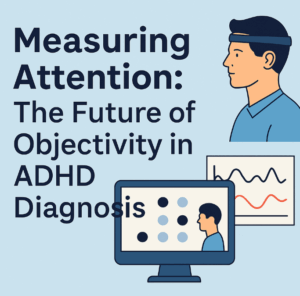QbTest for ADHD: Objectivity in Measuring Attention and Impulsivity
 When it comes to diagnosing ADHD (Attention-Deficit/Hyperactivity Disorder), clinical interviews, rating scales, and observations have always been the cornerstone. Parents describe distractibility, teachers report unfinished homework, and young people themselves often talk about struggling to “stay on track.” But ADHD is more than just a set of behaviors—it is a neurodevelopmental condition, and researchers have been working on tools that can bring objective measurement into the process.
When it comes to diagnosing ADHD (Attention-Deficit/Hyperactivity Disorder), clinical interviews, rating scales, and observations have always been the cornerstone. Parents describe distractibility, teachers report unfinished homework, and young people themselves often talk about struggling to “stay on track.” But ADHD is more than just a set of behaviors—it is a neurodevelopmental condition, and researchers have been working on tools that can bring objective measurement into the process.
One such tool is the QbTest.
What is QbTest?
QbTest (short for Quantified Behavior Test) is a computerized assessment designed to measure the core dimensions of ADHD:
-
Attention
-
Impulsivity
-
Activity level
It combines a continuous performance task (CPT) with an infrared motion tracking system. This means that while the participant is focusing on a computerized task (responding to certain stimuli and withholding responses to others), their physical activity is also being measured using a motion tracking device attached to a headband.
The result is a quantitative profile of how well the person sustains attention, controls impulses, and regulates activity.
How Does It Work?
The QbTest typically takes about 15–20 minutes for children and around 20–25 minutes for adults. During the test:
-
The participant sits in front of a computer screen.
-
They respond by pressing a button whenever a certain symbol appears.
-
At the same time, the motion tracker records their head movements, giving a precise measure of hyperactivity.
The software then generates a report, comparing the individual’s performance with normative data matched for age and gender.
Why is QbTest Useful?
-
Objective Data
While ADHD is primarily diagnosed through clinical assessment, QbTest provides measurable parameters that reduce reliance on subjective impressions alone. -
Treatment Monitoring
QbTest can be repeated to monitor treatment response. For example, improvements in attention or reductions in hyperactivity after starting medication can be tracked. -
Clinical Communication
Graphical reports help clinicians explain ADHD symptoms to families, teachers, and even the patients themselves. -
Reducing Diagnostic Uncertainty
In borderline cases or when comorbid conditions complicate the picture, QbTest adds another layer of evidence.
Limitations to Keep in Mind
-
Not a stand-alone diagnostic tool: QbTest does not “diagnose” ADHD. It should always be interpreted alongside clinical interviews, rating scales, and developmental history.
-
Requires controlled conditions: Distractions in the testing environment can affect results.
-
Costs and availability: Access may be limited in resource-constrained settings.
Where Does QbTest Fit in ADHD Care?
Think of QbTest as an adjunct—a way to add objectivity to the art and science of ADHD diagnosis and management. It does not replace the psychiatrist, psychologist, or pediatrician but supports them in making more informed decisions.
For families, seeing the data can often reduce stigma (“this is not just bad behavior, it’s measurable”) and provide motivation to continue with treatment.
The Bottom Line
ADHD care is moving toward neurobiologically informed assessment. Tools like QbTest, fNIRS, and QEEG are part of this evolution, aiming to complement clinical expertise with objective metrics. While not universally available yet, QbTest demonstrates how technology can bridge the gap between subjective experience and measurable evidence.
For clinicians, students, and parents alike, the message is clear: ADHD is real, measurable, and treatable—and tools like QbTest can help us see it more clearly.
Need clarity about ADHD for yourself or a loved one?
Objective tools like QbTest, fNIRS, and QEEG can add precision to diagnosis and treatment planning. If you’d like to explore ADHD assessment and care with a specialist, I’d be glad to help.
✦ About the Author
I’m Dr. Srinivas Rajkumar T, MD (AIIMS, New Delhi), Consultant Psychiatrist based in Chennai. Through my clinical practice and writing, I aim to make psychiatry more understandable and less intimidating.
📍 Mind and Memory Clinic, Apollo Clinic, Velachery, Chennai (Opp. Phoenix Mall)
📞 +91 85951 55808
🌐 srinivasaiims.com